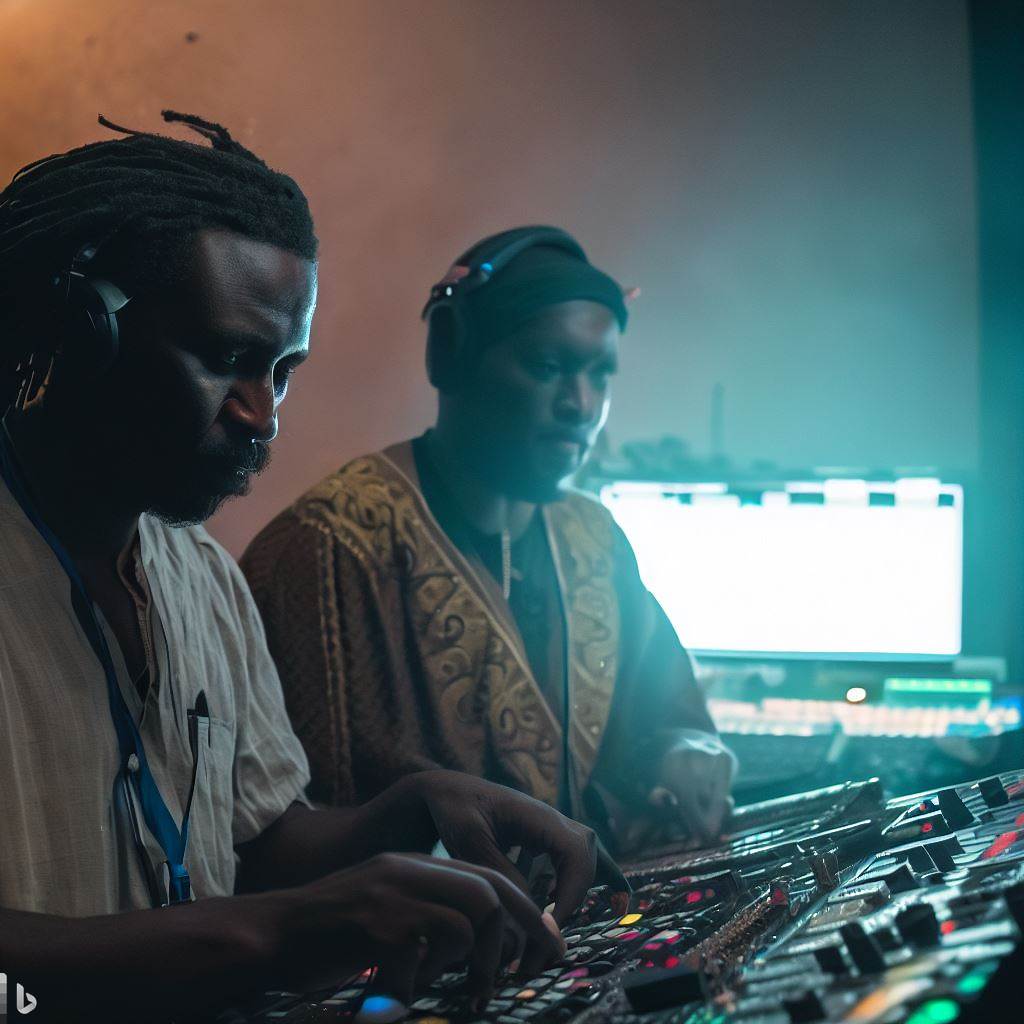Introduction
The Nigerian art scene is a tapestry of culture, reflecting the nation’s rich heritage and contemporary expressions.
Grasping the significance of managers in this scene is akin to holding a compass in a creative labyrinth.
This article illuminates the indispensable role managers play within the Nigerian art scene. It delves into their impact on artists and the broader industry, unveiling their multifaceted contributions.
Art in Nigeria isn’t just paint on canvas or sculptures; it’s a conduit of history, tradition, and innovation.
Navigating this realm requires more than artistic brilliance; it demands astute management.
Managers serve as conductors of an artist’s symphony, orchestrating exhibitions, negotiations, and marketing endeavors.
They’re the bridge between creators and the world, ensuring artists focus on their craft while logistics are harmonized.
In this dynamic art ecosystem, managers provide the essential scaffolding that uplifts artists.
They foster connections with galleries, collectors, and curators, propelling careers beyond borders.
By handling the business aspects, managers empower artists to immerse themselves deeper into their creative processes.
This section will explore captivating success stories, underscoring how adept management can elevate an artist from obscurity to global recognition.
Additionally, challenges faced by managers in this unique milieu will be examined, shedding light on their indispensable, though often uncelebrated, role.
Lastly, understanding managers’ roles in the Nigerian art scene is pivotal for artists, aspirants, and enthusiasts.
This discourse celebrates their contribution to an industry that thrives not just on artistry, but on strategic guidance.
Definition of art managers
Art managers play a pivotal role in Nigeria’s art scene by nurturing creativity, fostering connections, and facilitating growth.
Transform Your Career in Nigeria
Discover unmatched expertise with our personalized Career Consulting service. Navigate Nigeria’s job market with a strategy tailored just for you.
Get StartedArt Managers’ Responsibilities
- Promotion and Marketing: Art managers actively promote artists’ work through exhibitions, online platforms, and collaborations.
- Networking: They establish valuable connections with galleries, curators, collectors, and fellow artists.
- Logistics: Art managers handle logistical aspects of exhibitions, ensuring smooth operations and timely setups.
- Financial Management: They oversee budgeting, pricing, and sales to ensure artists receive fair compensation.
- Contract Negotiations: Art managers secure beneficial contracts for artists, safeguarding their rights and interests.
- Public Relations: They manage the artist’s public image, handling media interactions and press releases.
- Strategic Planning: Art managers devise long-term plans to elevate the artist’s career and reach broader audiences.
Importance of art managers
Art managers act as guiding lights, providing crucial support to artists:
- Expertise: Their industry knowledge helps artists navigate the complex art world effectively.
- Time and Focus: Art managers handle administrative tasks, allowing artists to focus solely on their craft.
- Career Growth: By opening doors to opportunities, art managers accelerate artists’ career advancement.
- Stress Reduction: Managing logistics and negotiations, they alleviate stress for artists.
- Balanced Decisions: Art managers offer objective advice, aiding artists in making informed decisions.
- Advocacy: They advocate for artists, ensuring fair treatment and recognition in the industry.
- Artistic Freedom: Art managers create environments where artists can freely express and innovate.
In sum, art managers are the backbone of the Nigerian art scene, providing essential guidance, support, and expertise to artists.
Their multifaceted roles contribute significantly to the growth and recognition of Nigerian art on the global stage.
Read: Exploring Artists’ Agent Career: A Nigerian Perspective
The significance of art managers in the Nigerian art scene
Historical development of art management in Nigeria
- Art management has evolved in Nigeria alongside the growth of the art scene.
- In the past, artists took on both artistic and managerial roles due to limited resources.
- However, as the Nigerian art scene expanded, the need for specialized art managers became evident.
- In the 1970s, art management started to gain recognition and professionalization in Nigeria.
- Institutions such as the National Gallery of Modern Art played a crucial role in promoting art managers.
Rise of professional art management companies in the country
- In recent years, there has been a rise in the establishment of art management companies in Nigeria.
- These companies offer services such as marketing, promotion, and business development for artists.
- They assist artists in navigating the art industry, connecting them with relevant contacts and opportunities.
- Professional art management companies provide a structured approach to managing an artist’s career.
- They handle tasks such as contract negotiations, exhibition planning, and financial management.
Influence of art managers on the commercial success of Nigerian artists
- Art managers play a crucial role in enhancing the commercial success of Nigerian artists.
- They help artists build professional networks and establish collaborations with galleries and collectors.
- Art managers assist in marketing artists’ works, creating brand strategies, and promoting their unique artistic vision.
- Through effective management, artists can focus more on their creative process and artistic development.
- Art managers also contribute to creating a sustainable art market in Nigeria, ensuring artists receive proper recognition and financial rewards.
Basically, art managers have become an integral part of the Nigerian art scene.
With the historical development of art management in Nigeria, artists now have access to professional support and guidance.
The rise of art management companies further solidifies the significance of these professionals in the industry.
Through their efforts, art managers enhance the commercial success of Nigerian artists, helping them establish connections, market their works, and focus on their artistic development.
Ultimately, art managers contribute to the growth and sustainability of the Nigerian art scene.
Read: Rising Stars: Nigeria’s Top Emerging Costume Designers
Roles and responsibilities of art managers in Nigeria
In the Nigerian art scene, art managers play a crucial role in supporting and guiding artists throughout their careers.
These professionals take on various responsibilities and perform several key roles to help artists thrive and succeed.
Representation and negotiation on behalf of the artist
One of the primary roles of art managers in Nigeria is to represent and negotiate on behalf of the artist.
This involves interacting with galleries, curators, and collectors to secure exhibitions, commissions, and sales for the artist’s work.
Your Unique Story, Perfectly Told
Don't let your dream job slip away with a generic resume. We craft personalized resumes and cover letters that highlight your unique strengths, making you unforgettable to Nigerian employers.
Get HiredArt managers act as intermediaries, ensuring that the artist’s interests are protected and that they receive fair compensation for their art.
Promotion and marketing strategies to enhance artists’ visibility
Another important responsibility of art managers is to develop effective promotion and marketing strategies to enhance the visibility of artists.
They utilize various channels, such as social media, art publications, and networking events, to promote the artist’s work and build their reputation.
Art managers also collaborate with PR professionals and marketing agencies to create impactful campaigns that attract attention to the artist’s talent and unique style.
Financial management and budgeting for exhibitions and projects
Art managers in Nigeria also handle the financial aspects of an artist’s career.
They are responsible for managing the artist’s finances, including budgeting for exhibitions, projects, and art supplies.
Art managers track expenses, negotiate contracts, and ensure that the artist’s income is properly managed and allocated.
This financial expertise allows artists to focus on their creative work without worrying about the administrative and financial aspects of their careers.
Networking and collaboration opportunities for artists
Art managers actively seek networking and collaboration opportunities for artists.
They connect artists with other professionals in the art industry, such as curators, gallery owners, and fellow artists.
These collaborations can lead to joint exhibitions, artist residencies, and international opportunities.
Art managers facilitate connections and foster relationships that expand an artist’s network, opening doors to new and exciting projects.
In addition, art managers in Nigeria play essential roles in supporting and advancing the careers of artists.
Their representation and negotiation skills, promotion and marketing strategies, financial management expertise, and networking abilities contribute to the growth and success of artists in the Nigerian art scene.
Transform Your LinkedIn Presence
Don't let your LinkedIn profile blend into the crowd. We uniquely craft profiles that showcase your professional story, making Nigerian recruiters take notice like never before.
Stand OutRead: Career Progression for Artists’ and Performers’ Agents

Challenges faced by art managers in Nigeria
Limited resources and funding for art management companies
- Art managers in Nigeria often face the challenge of limited financial resources and funding.
- Without adequate funding, it becomes difficult for art management companies to execute their projects effectively.
- Lack of resources also hinders the growth and development of artists under their management.
- Relying on sponsorships and donations can be unreliable and inconsistent.
- Art managers have to constantly seek alternative funding sources to sustain their operations.
Lack of recognition and support from government and society
- Art managers in Nigeria often struggle with a lack of recognition and support from both the government and society.
- The government’s focus on other sectors often results in a neglect of the arts.
- As a result, the art scene suffers from a lack of institutional support and infrastructure.
- The general public’s perception of art as merely entertainment rather than a valuable cultural asset further limits support.
- Without proper recognition and support, art managers find it challenging to create a thriving artistic community.
Balancing artistic vision with commercial success
- One of the significant challenges faced by art managers in Nigeria is balancing artistic vision with commercial success.
- Artists often have their unique artistic visions that may not align with commercial demands.
- Art managers have to find a delicate balance between maintaining artistic integrity and achieving financial viability.
- Ensuring that artists’ creative expressions retain their originality while also appealing to the market is a constant struggle.
- Art managers must possess business acumen to navigate the fine line between art and commerce.
In essence, art managers in Nigeria face several challenges while navigating the art scene in the country.
Limited resources and funding, lack of recognition and support from the government and society, and the struggle to balance artistic vision with commercial success are some of the key obstacles they encounter.
Overcoming these challenges requires innovative thinking, resourcefulness, and a commitment to fostering a thriving artistic community.
Read: Balancing Free Speech and Reporting in Nigeria
Success stories of art managers in Nigeria
Case study 1: The impact of an art manager on a renowned Nigerian artist’s career
- Adeola Oladele, a renowned Nigerian artist, struggled to navigate the art scene alone.
- Oladele wanted to focus on her creative process but needed someone to handle the business side.
- She enlisted the help of an art manager who had expertise in marketing and networking.
- The art manager created a brand strategy for Oladele, giving her a strong online presence.
- Through the art manager’s connections, Oladele gained exposure through exhibitions and galleries.
- As a result, Oladele’s career flourished, and she became a recognized name in the Nigerian art scene.
- The art manager’s guidance and support played a crucial role in Oladele’s artistic success.
Case study 2: How an art management company assisted in launching the career of a promising newcomer
- A young artist named Uche Eze had immense talent but lacked the necessary resources and exposure.
- He approached an art management company to help him establish his career in the Nigerian art scene.
- The art management company recognized Eze’s potential and developed a comprehensive plan.
- They organized a solo exhibition for Eze, showcasing his unique artworks to a wide audience.
- The art management company also handled Eze’s marketing, promotions, and negotiations with galleries.
- Through their efforts, Eze gained significant recognition and secured contracts with prestigious galleries.
- The art management company’s expertise and strategic approach played a pivotal role in Eze’s success.
In a nutshell, these success stories highlight the invaluable role of art managers in the Nigerian art scene.
From guiding established artists to launching promising newcomers, art managers contribute significantly to the growth and recognition of artists.
Their expertise in marketing, networking, and business management allows artists to focus on their creativity, ultimately leading to successful careers.
As the Nigerian art scene continues to thrive, the involvement of art managers will remain crucial for artists to reach their full potential.
Conclusion
Art managers play a crucial role in the Nigerian art scene.
They act as intermediaries between artists and the audience and help in promoting the works of Nigerian artists. The future of art management in Nigeria looks promising.
With the growing recognition of Nigerian artists globally, there will be an increased demand for professional art managers.
Artists should not underestimate the significance of art management.
By partnering with professional art managers, they can increase their visibility and reach new audiences.
Art managers provide valuable guidance and support, helping artists focus on their craft while handling the business and administrative aspects of their careers.
To thrive in the competitive art industry, artists should consider investing in art management services to expand their career prospects and achieve artistic growth.
Therefore, it is essential for Nigerian artists to embrace the role of art managers and seek their expertise for long-term success.



